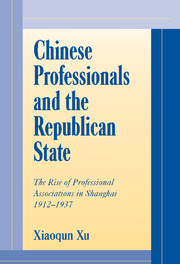 Chinese Professionals and the Republican State
Chinese Professionals and the Republican State Book contents
- Frontmatter
- Contents
- List of Tables
- Acknowledgments
- Abbreviations of Frequently Cited Sources
- Introduction
- Part I Professions and Professionals
- 1 Professions in Early-Twentieth-Century Shanghai
- 2 Professionals as Urban Middle Class
- Conclusion to Part I
- Part II Social Institutions, State Actions, and Professionalization
- Part III Professionalism, Nationalism, and Politics
- Conclusion
- Glossary
- Bibliography
- Index
Conclusion to Part I
Published online by Cambridge University Press: 07 September 2009
- Frontmatter
- Contents
- List of Tables
- Acknowledgments
- Abbreviations of Frequently Cited Sources
- Introduction
- Part I Professions and Professionals
- 1 Professions in Early-Twentieth-Century Shanghai
- 2 Professionals as Urban Middle Class
- Conclusion to Part I
- Part II Social Institutions, State Actions, and Professionalization
- Part III Professionalism, Nationalism, and Politics
- Conclusion
- Glossary
- Bibliography
- Index
Summary
CHAPTERS 1 and 2 have demonstrated how China's modernization actually effected socioeconomic transformation and affected people's lives in the process. The emergence of professions and professionals obviously represented an important aspect of the modernization process.The emergence led to the more pronounced external differentiation of social groups or classes from one another and at the same time to the more intricate internal stratification of each group or class into more stripes and shades than ever before. It both complicated and simplified the ways in which social groups related to and communicated with each other, because the socially more differentiated groups were functionally more integrated in an urban environment than in traditional times.The emergence also resulted in increasingly necessary but increasingly complex interaction between the state and society. In the case of professionals, despite an internal stratification among themselves, professionals constituted a particular social category or class that grew out of modernization. In terms of their life-style and material and cultural consumption characteristic of an urban elite culture, they were in the company of transitional urban gentry-merchants and capitalists in Shanghai and a world apart from working-class people. On the other hand, as this study will show, their professional concerns and commitments distinguished them from the bourgeoisie, but sometimes coincided with the latter's agenda, especially when acting for nationalist causes or confronting expanding state power. It is in the midst of these complex relationships that the Chinese urban society in the Republican era continued (from late Qing) to grow more heterogeneous, with increasingly pluralistic social interests.
- Type
- Chapter
- Information
- Chinese Professionals and the Republican StateThe Rise of Professional Associations in Shanghai, 1912–1937, pp. 78Publisher: Cambridge University PressPrint publication year: 2000
